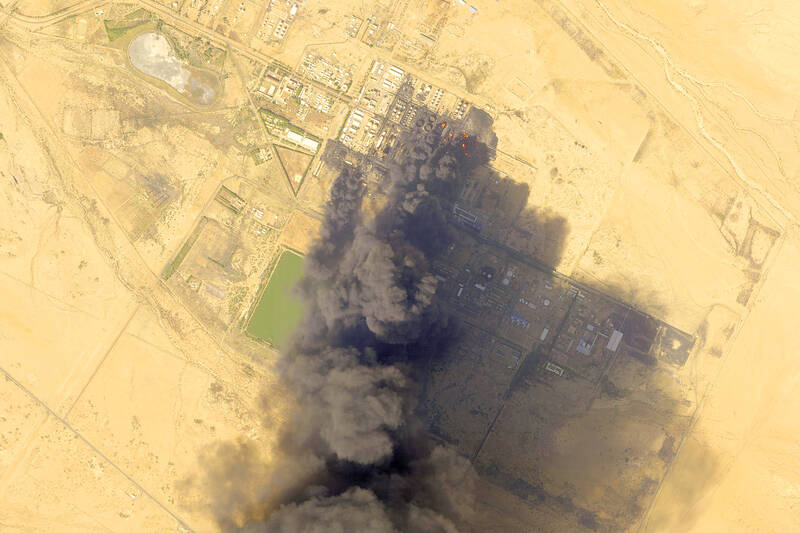Fighting around Sudan‘s largest oil refinery set the sprawling complex ablaze, satellite data analyzed by The Associated Press (AP) yesterday showed, sending thick and black polluted smoke over the country’s capital.
The attacks around the refinery, owned by the Sudanese government and the Chinese state-run China National Petroleum Corp, represent the latest woe in a civil war between the rebel Rapid Support Forces (RSF) and Sudan’s military, who blamed each other for the blaze.
International mediation attempts and pressure tactics, including a US assessment that the RSF and its proxies are committing genocide, have not halted the fighting.

Photo: Planet Labs PBC via AP
The al-Jaili refinery sits about 60km north of Khartoum, the capital. The refinery has been subject to previous attacks as the RSF has claimed control of the facility since April 2023, as their forces had been guarding it. Sudanese media report the RSF also surrounded the refinery with fields of landmines to slow any advance.
However, the facility, capable of handling 100,000 barrels of oil a day, remained broadly intact until Thursday.
An attack on Thursday at the oil field set fires across the complex, according to satellite data from NASA satellites that track wildfires worldwide.
Satellite images taken by Planet Labs PBC on Friday for the AP showed vast areas of the refinery ablaze. The images showed flames shooting up into the sky in several spots. Oil tanks at the facility stood burned, covered in soot.
Thick plumes of black smoke towered over the site, carried south toward Khartoum by the wind. Exposure to that smoke can exacerbate respiratory problems and raise cancer risks.
In a statement released on Thursday, the Sudanese military alleged the RSF was responsible for the fire at the refinery.
The RSF “deliberately set fire to the Khartoum refinery in al-Jaili this morning in a desperate attempt to destroy the infrastructures of this country,” the statement read.
“This hateful behavior reveals the extent of the criminality and decadence of this militia ... [and] increases our determination to pursue it everywhere until we liberate every inch from their filth.”
The RSF on Thursday night alleged that Sudanese military aircraft dropped “barrel bombs” on the facility, “completely destroying it.”
The RSF has claimed the Sudanese military uses old commercial cargo aircraft to drop barrel bombs, such as one that crashed under mysterious circumstances in October last year.
Neither the Sudanese military nor the RSF offered evidence to support their dueling allegations.
China, Sudan’s largest trading partner before the war, has not acknowledged the blaze at the refinery. The Chinese Ministry of Foreign Affairs did not respond to a request for comment.

The team behind the long-awaited Vera Rubin Observatory in Chile yesterday published their first images, revealing breathtaking views of star-forming regions as well as distant galaxies. More than two decades in the making, the giant US-funded telescope sits perched at the summit of Cerro Pachon in central Chile, where dark skies and dry air provide ideal conditions for observing the cosmos. One of the debut images is a composite of 678 exposures taken over just seven hours, capturing the Trifid Nebula and the Lagoon Nebula — both several thousand light-years from Earth — glowing in vivid pinks against orange-red backdrops. The new image

Canada and the EU on Monday signed a defense and security pact as the transatlantic partners seek to better confront Russia, with worries over Washington’s reliability under US President Donald Trump. The deal was announced after a summit in Brussels between Canadian Prime Minister Mark Carney and European Commission President Ursula von der Leyen and European Council President Antonio Costa. “While NATO remains the cornerstone of our collective defense, this partnership will allow us to strengthen our preparedness ... to invest more and to invest smarter,” Costa told a news conference. “It opens new opportunities for companies on both sides of the

ESPIONAGE: The British government’s decision on the proposed embassy hinges on the security of underground data cables, a former diplomat has said A US intervention over China’s proposed new embassy in London has thrown a potential resolution “up in the air,” campaigners have said, amid concerns over the site’s proximity to a sensitive hub of critical communication cables. The furor over a new “super-embassy” on the edge of London’s financial district was reignited last week when the White House said it was “deeply concerned” over potential Chinese access to “the sensitive communications of one of our closest allies.” The Dutch parliament has also raised concerns about Beijing’s ideal location of Royal Mint Court, on the edge of the City of London, which has so

With a monthly pension barely sufficient to buy 15 eggs or a small bag of rice, Cuba’s elderly people struggle to make ends meet in one of Latin America’s poorest and fastest-aging countries. As the communist island battles its deepest economic crisis in three decades, the state is finding it increasingly hard to care for about 2.4 million inhabitants — more than one-quarter of the population — aged 60 and older. Sixty is the age at which women — for men it is 65 — qualify for the state pension, which starts at 1,528 pesos per month. That is less than US$13